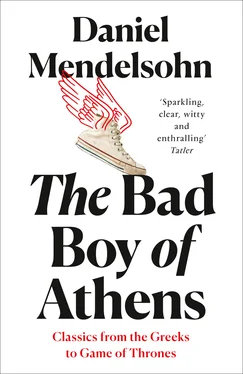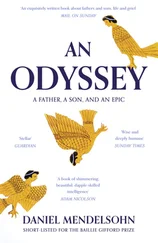You could argue, indeed, that what makes Euripides’ heroine awesome is not that she’s a woman on the verge of a nervous breakdown, but that, if anything, she has the capacity to think like a man . Or, perhaps, like a lawyer. Euripides, we know, was very interested in the developing art of rhetoric, an instrument of great importance in the workings of the Athenian state. The patent content of Euripides’ play, the material that seems to be about female suffering, is by now so famous, and so familiar-seeming, that it has obscured the play’s other preoccupations: chief among these is the use and abuse of language. In every scene, Medea is presented as a skilled orator; she knows how to manipulate each of her interlocutors in order to get what she wants, from the chorus (to whom she smoothly suggests that she’s a helpless girl, just like them) to the Corinthian king Creon, whom she successfully manipulates by appealing to his male vanity. Indeed, we’re told from the play’s prologue right on through the rest of the drama that what possesses Medea’s mind is not simply that her husband has left her for a younger woman, but that Jason has broken the oath (an ironclad prenup if ever there was one) that he once made to her. Oaths are crucial throughout the play: its central scene has her administering one to Aegeus, the Athenian king, who happens to be passing through Corinth on this terrible day, and who is made to swear to Medea that he will offer her sanctuary at Athens, should she ever go there. (Among other things, this oath furnishes her with her escape plan: rather than being an emotional wreck, Medea is always calculating, always thinking ahead.)
For the Greeks, all this had deep political implications. One of the reasons everyday Athenians were suspicious of the Sophists, those deconstructionists of the Greek world (with whom Socrates was mistakenly lumped in the common man’s mind, not least because Aristophanes, in another satirical play, put him there), was that the rhetorical skills they were thought to teach could confound meaning itself – could ‘make the worse argument seem the better’, and vice versa. In Jason, Euripides created a character who is a parody of sophistry: he’s glibness metastasized, rhetorical expertise gone amok. When he enters and tells Medea that he’s only marrying this young princess for Medea’s own sake, that he’s doing it all for her and the kids, it’s not because he thinks it’s true: it’s because he thinks he can get away with saying it’s true. Language, words – it’s all a game to him. Look, Euripides seems to be saying to his audience, men for whom the ability to make a persuasive speech could be, sometimes literally, a matter of life or death: look what moral corruption your rhetorical skills can lead to. Medea, of course – obsessed from the beginning of the play with oaths, the speech act whose purpose it is to fuse word and deed – is outraged by her husband’s glibness, and spends her one remaining day in Corinth seeking ways to make him see the value of that which he so slickly uses merely as argumentative window dressing: his marriage, his children. That is why she kills the children. (The typically Euripidean irony – one that would likely have unnerved the Athenians – is that this spirited defence of language is mounted by a woman, and a foreigner: a sign, perhaps, of the sorry state public discourse was in.)
A Medea that was all about the moral disintegration that follows from linguistic collapse probably wouldn’t sell a great many tickets in an age that revels in seeing characters ‘deal with’ being failures, but it’s the play that Euripides wrote. Because Deborah Warner thinks that Medea is a disappointed housewife, and the play she inhabits is a drama of a marriage gone sour, all of the political resonances are lost. (When Shaw administers that crucial oath to Aegeus, she shrugs with embarrassment, as if she has no idea how this silly stuff is done, or what it’s all supposed to be about.) At the Brooks Atkinson, her Jason, a very loud man called Jonathan Cake, has been instructed to play that crucial first exchange between Medea and Jason totally straight – as if he believes what he tells Medea. (‘He believes his argument that if he marries Creon’s daughter they will get this thing called security,’ the director told the Guardian .) But if Jason is earnest – if he really believes what he’s saying, which is that he’s running off with a bimbo and abandoning his children and allowing them to be sent into exile because, hey, it’s good for them! – then the scene, to say nothing of the play, crumbles to pieces. If you take away the mighty conflict over language, over meaning what you say, Medea is just a daytime drama about two nice people who have lost that special spark. But then what do you do with the rest of the play, with its violence and anguished choruses and harrowing narratives of gruesome deaths – and, most of all, with the climactic slaughter – all of which follow only from Medea’s burning mission to put the meaning back in Jason’s empty rhetoric, those disingenuous claims to care for his family, his children, even as he shows nothing but naked self-interest?
Not much, except to do what Warner (who insists the play is ‘not about revenge’) does, which is to fill the play with desperate, crude, almost vaudevillian efforts to manufacture excitement, now that all the intellectual and political excitement – to say nothing of the revenge motive – have been stripped away. This Medea makes faces, mugs for the audience, cracks jokes, does impressions. And it goes without saying that, when the violence does come, there’s a lot of blood and flashing lights and deafening synthesized crashing and clattering. But for all the histrionics and special effects, you feel the hollowness at the core, and the staging soon sinks back into the place where it started: banal, everyday domesticity, a failed marriage. The Warner/Shaw Medea ends with the murderous mother sitting in that swimming pool, smirking and splashing the weeping Jason.
Ironically, Deborah Warner seems to understand tragedy’s original political intent. In an interview she gave to the Times last September, after the first anniversary of the September 11 attacks and as her country, and ours, prepared for war on Iraq, Warner made a case for the renewed relevance of Greek tragedy:
We desperately need Greek plays. We need them when democracies are wobbly. I am living in a very wobbly democracy right now, whose Parliament has only just been recalled, and Commons may or may not have a vote about whether we go to war.
Greece was a very new democratic nation, and a barbaric world was not very far behind them. They offered these plays as places of real debate. We can’t really say the theatre is a true place of debate anymore, but these plays remind us of what it could be.
She’s absolutely right; all the more unfortunate, then, that none of this political awareness informs her production. The end of Warner’s Medea feels very much like the aftermath of a marital disaster. Euripides’ Medea , by contrast, ends with a monstrous ethical lesson: Jason is forced, as his wife had once been forced, to taste exile, loss of family; forced, like her, to live stranded with neither a past nor a future; is made to understand, at last, what it feels like to be the other person, to understand that the things to which his glib words referred are real, have value, can inflict pain. At the end of Euripides’ Medea , the woman who teaches men these terrible lessons flies off in a divine chariot, taking her awful skills and murderous pedagogical methods to – Athens.
Indeed, while it’s hard to see what Warner’s ‘happy housewife of Corinth’ can tell us about the war she referred to in her comments to the Times – i.e., Iraq – Euripides’ Medea , by contrast, ends by literally bringing home a shattering warning against political and rhetorical complacency: a lesson that, as we know, went unheeded in Athens. It’s worth noting that his Medea was composed during the year before the outbreak of the Peloponnesian War, when the Athenians were eagerly preparing for conflict – a conflict, as it turned out, that would thoroughly reacquaint the Athenians with the meaning of the word ‘consequences’. Which is the play we need more desperately?
Читать дальше












